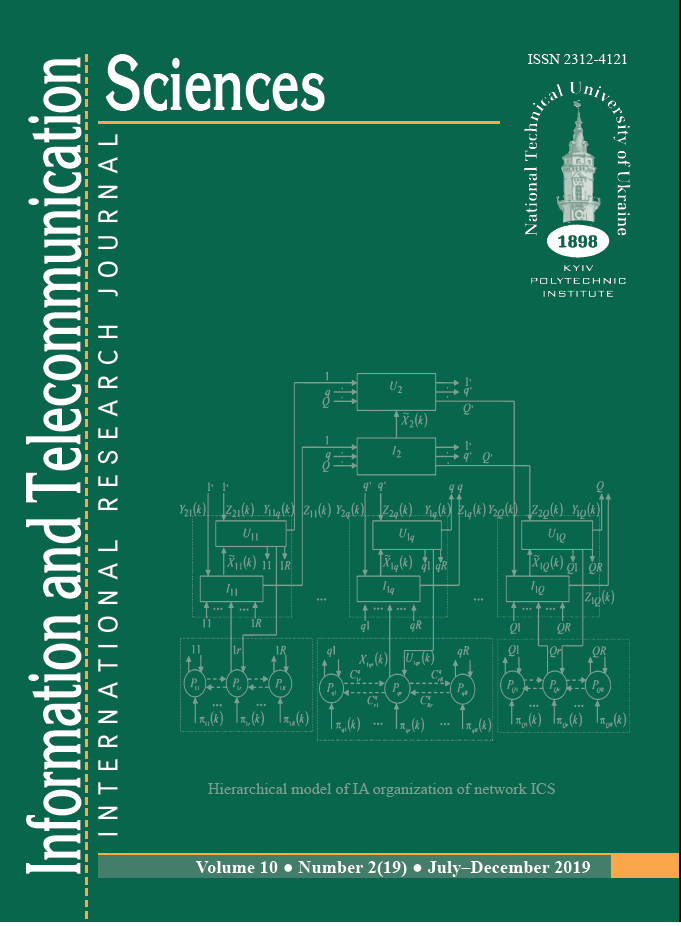ІNCREASING THE ACCURACY OF DETERMINING THE COORDINATES OF ELEMENTS OF WIRELESS SENSOR NETWORKS
DOI:
https://doi.org/10.20535/2411-2976.22019.29-33Keywords:
wireless sensor network, coordinate elements of wireless sensor networks, adaptive-regularization filtering algorithm.Abstract
Background. Modern methods for determining the coordinates of elements of wireless sensor networks allow solving problems with a single determination and errors in determining the mutual distances between elements of a wireless network. In the case of increasing requirements for the accuracy of determining the coordinates of network
elements, existing methods do not allow solving the problem.
Objective. Improving the accuracy of estimating the coordinates of elements of wireless sensor networks based on multiple measurements of distances between network elements.
Methods. The determination of the coordinates of the elements of wireless sensor networks is implemented in two stages. At the first, by repeatedly measuring the mutual distances between the elements, an estimate of the coordinates and a correlation matrix of errors in estimating the coordinates of the elements of the wireless s ensor network are determined. In the second, in order to improve the accuracy and ensure the stability of the estimation process, an adaptively regularized Kalman filtering algorithm is proposed to refine the coordinate estimates and the correlation matrix of errors
Results. The proposed method, based on the adaptive-regularized estimation algorithm, according to the results of simulation, allows increasing the accuracy of estimating the location parameters of wireless sensor networks by an average of 12-16% and at the same time provides stability and convergence of the estimation process.
Conclusions. The considered method for determining the coordinates of elements of wireless sensor networks can be implemented in modern terrestrial sensor networks for various purposes.
References
Lysenko O., Uryadnikova I., Valuiskyi S., Nechyporenko I. A method of controlling the topology of aerial repeaters network to improve structural information connectivity of wireless ad hoc networks Liptovsky Mikulas, Slovak Republic: Armed Forces
Academy. Science&Military, №1, Volume 7, 2012, p. 62-71. ISSN 1336-8885.
Kashuba S., Novikov V., Alekseeva I., Lysenko O. Optimization of Unmanned Aerial Vehicle Path for Wireless Sensor Network Data Gathering. 3rd International Conference: Actual problems of
unmanned aerial vehicles developments (APUAVD-2015) October 13-15, 2015 Organized by IEEE Ukraine Section Joint SP/AES Chapter and the National Aviation University (Kyiv), p.280-283.
Langdon M. "ZigBee goes underground", E&T Magazine, 2009, Aug.
Voroshilin E.P. Determination of the coordinates of radio emission sources, // M.V. Mironov, V.A. Gromov. TUSUR reports, No. 1 (21), part 2, 2010
Grewal M.S., Andrews A.P., “Kalman Filtering — Theory and Practice Using MATLAB”, Wiley, 2001.
Batishchev V. I, “Principles for the construction of stable regularized Kalman filters”// Samara State Technical University, Samara, 2000, 151–156.
Ali Hussein Hasan, Aleksandr N. GrachevAdaptive - filter for Target Tracking Using Real Time Genetic Algorithm // Journal of Electrical and Control Engineering. 2013. Vol. 3, No. 4. P. 32-38.

